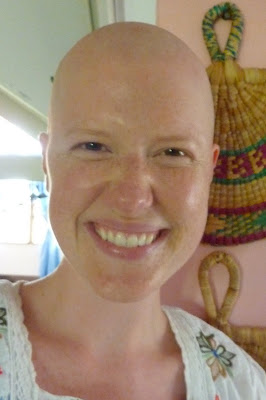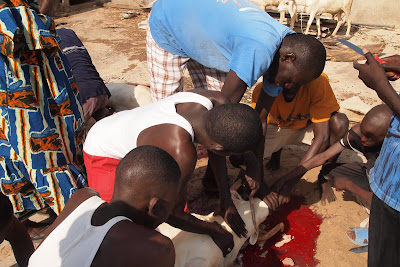Guinean Adventure
I am going to start with the end of my journey, which made quite an impression on my résumé of adventures and recount in reverse. So here it goes: For those of you who were alive in the 70’s, I am sure you remember the hatchbacks of that era. Have you wondered what happened to all those vehicles once in circulation? I’m sure that some were junked, but the rest ended up in West Africa, in Guinea in particular. I had the pleasure of riding in two different bush taxis as they are called in Guinea on my way out. A testimony to the ingenuity of man, these vehicles stand the test of time and circumstances, much like the Guinean mechanics, swarthy men and tough kids. It seems as if travel by land in Guinea (and Africa in general, but to remain close to my personal account, I will be precise in saying Guinea) is indelibly memorable due to its extreme nature and harsh conditions, particularly the roads. Guinean roads are poorly if at all paved. The paved roads have so many potholes that you have to drive slowly and expertly, dogging the deep holes and loose pieces of road that had become dislodged. At least these were remarkably better than the road leading to Senegal, which is rather like an obstacle course with small hills of sand and dips and curves that must be artfully handled.
With a broken down auto on my way out of Guinea, I spent the first night in the front seat, shuffling around, trying to stay warm (it felt about 40 degrees that night) and looking at the clear, brilliant stars above me. How those stars reminded me of the grace of God and his son Jesus whom he sent to save the world from its sins and problems. I celebrated Christmas as I gazed up at those stars, wondering if my feet were going to freeze in their flip-flops. At five am, I stumbled out of the car, assaulted by the cold, and grabbing my backpack, I hopped a bus that was passing and heading to my destination. I found a second car to take me across the border after traversing 8 hours of treacherous road; however I was unaware that part of the journey included spending a second night under the stars. I was not too happy about this delay and my positive and thankful spirit failed me for about five minutes, which I have dubbed the “five-minute funk.” I decided that five minutes of discontentedness, frustration and general negativity is allowed before one must take a stand against being emotionally waylaid by undesirable circumstances.
This time, I found myself a little shelter, kicked the goat poop to the side, laid down my mat and snuggled into my sleeping bag. Once again I celebrated God’s goodness in turning my regard towards the immensity of the stars, sizzling in the distance. Thanks to the enterprising individuals selling coffee and breakfast from an early hour, I bought some hot water and porridge, which warmed my rigid body and limbered up my spirits for the day ahead, which proved to be the worst of the three days. I arrived in Manda Douane, which has been developed around the transportation industry. Nothing but rows of simple canteen-like restaurants, small shops selling sundry items, and beat-up vehicles existed in this ghost-like town. Here is where I spent almost all of Christmas Eve, feeling tired, disjointed and restless, waiting for the mini-bus to fill up, but continually joyful and prayerful. I met a Rasta who became my travel buddy and friend throughout the journey. Truly I appreciate the small contact I make with those around me. How refreshing genuine human connection, whether on a small, brief scale or in a lasting, profound way!
Which brings me to the start of my journey: a team of 12 Senegalese men and a young female adventurer. I accompanied this group on a work mission for the World Bank to build up the riverbanks of the Senegal River and to build wells for the local population in Kalan/Labé and Dounet/Mamou. From both a social and cultural perspective, traveling with this mission was an enriching experience. We stayed in hotels for the first two nights, followed by the settling into a small complex the mission has rented for the duration of the five months of work previewed for the project. The complex is located in Dounet, a small no-nothing village in the middle of Guinea, where one has the impression that the world has stopped, except for the minute prickles of modernity including Western clothes, cars, and cell phones. Electricity is nonexistent! I have never resided in a town where electricity is absent. Truly the stars and the moon shine. Thankfully I had my headlamp and Kindle eBook light, which permitted me to write in my journal and to read after the setting of the sun. For one dollar I was able to fully charge my troupe of electronic devices at a little stand using a gasoline generator for electrical power.
What does one do in the middle of nowhere but hike, reflect, ponder, write, read, muse, wander? Exactly what I was searching, I thoroughly exploited every minute of my time in Guinea for the general purpose of opening wide my appreciation for the beauty of God’s creation, in plenitude and grace, and the depths of my soul. I hired a guide, who ended up being a jeweler and a government official and quite ill-equipped physically for long hikes but who at least spoke the language and knew his way around the vicinity. My last day I abandoned my guide and went on a 22-mile hike to an isolated village, passing the whole day in rapture, appreciating the virgin forests, rice and other various fields and most of all the solitude. What I esteemed most on this adventure was the general freedom I felt and seized. To be a part of a group and yet to remain autonomous was a blessing for me and empowered me to stretch out and investigate my surroundings. There is a strong possibility that I will return to Guinea for a longer period of time in the future. The savage beauty and the agricultural potential played with my strong affiliation for thrill and entrepreneurial escapades. All in all, I felt refreshed and now look forward to beckoning the New Year!
Destination for my 22-mile, eight-hour walk through the Guinean countryside
Tip #8 for Surviving in Guinea: Always have your flashlight packed in your bag for when the lights go out. I am sure that most of you have camped at least once in your life. Non-electrified villages are like one big campsite. When the sun goes down, only the light of the moon and the fires remain. Thankfully with a handy flashlight you can guide your foot on a rocky path, read a few words of wisdom or write your thoughts before tucking yourself in for the black, silent night.











Comments